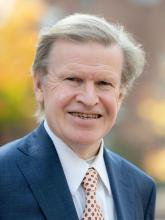You are here
Germany’s Weimar ghosts
Sep 26,2017 - Last updated at Sep 26,2017
Germany’s election result presents an odd paradox. Chancellor Angela Merkel’s Christian Democratic Union (CDU) is unquestionably the strongest party, and a new government without it is unthinkable. But both the CDU and its previous coalition partner, the Social Democrats (SPD), did poorly.
Many SPD leaders’ initial reaction to their party’s 20.4 per cent showing (down from 25.7 per cent in 2013) has been to embrace a stint in the opposition.
That response — a flight from power — was characteristic of politics in inter-war Germany’s short-lived democratic experiment, the Weimar Republic.
Since the beginning of the Federal Republic, in 1949, one question has always haunted German politics: Could the Weimar experience be repeated, with the radical right triumphing again?
Now that an extremist party, the Alternative für Deutschland (AfD), has won seats in the Bundestag for the first time since World War II, the question has stepped out of the shadows.
There are some obvious Weimar parallels.
In Weimar, even in the relatively stable years of the mid- and late 1920s, before the onset of the Great Depression, parties were punished by voters when they participated in government, and rewarded when they styled themselves as alternative or protest parties. Between 1924 and 1928, the moderate right was in a coalition government, and then suffered massively; after 1928, the SPD was similarly punished for joining a coalition.
Then came the depression, and the same mechanism applied even more forcefully: it was political suicide to support the government — or, as the increasingly radical opposition called it, the system. The result was a flight from responsibility, with voters punishing the politicians who remained ever more severely.
If there is room for optimism about the German election result, it lies in the outcome’s closeness to the European norm.
The AfD vote, at 13 per cent, is almost the same share that the populist Geert Wilders won in the Netherlands in April, in an election that was widely seen as a defeat for radical populism.
It is clear that an overwhelming majority of Germans do not support the AfD, whose fortunes could soon fade, owing to a probable split in its leadership.
In fact, it is hard to see a basis for the AfD’s continued growth.
In many industrialised countries, elections are often treated as a simple reflection of the state of the economy. And this is especially true in Germany.
Voters in the home of the post-war Wirtschaftswunder (economic miracle) are proud that they have the eurozone’s strongest economy, which is prospering.
Employment is at record levels. Visitors to Munich’s Oktoberfest come in greater numbers, drink more and eat more, but are less violent and commit fewer crimes. Even the eurozone as a whole is in a surprisingly strong recovery.
But governments are like people: after a long time in one position, they run out of ideas.
At the end of 2016, Merkel looked tired, and a new SPD leader, Martin Schulz, benefited from a short-lived burst of support in opinion polls. But when it turned out that Schulz had no new ideas, either, enthusiasm gave way to disenchantment.
The government coalition’s poor showing seems to be a clear reflection of widespread frustration with leaders who have nothing new to offer. And the election result will make a new coalition difficult to form.
The most plausible — in fact the only — real alternative to a CDU-SPD grand coalition would be a larger grouping involving both the liberal Free Democrats (FDP) and the Greens (a so-called Jamaica coalition, because the parties’ colours are those of the Jamaican flag).
It is often said that Merkel would have liked a CDU-Green coalition alone, as she has moved very close to the Greens’ agenda in many areas since announcing a rapid exit from nuclear energy after Japan’s 2011 Fukushima disaster.
But a Jamaica coalition will be difficult to negotiate, because the FDP is much more conservative on many economic issues, especially fiscal transfers to the rest of the eurozone.
Still, a Jamaica coalition is not out of the question — and it could mean new policies for Germany.
Whereas the FDP’s political profile is much closer to classic market liberalism, over the past 10 years the Greens have become more receptive to market mechanisms as the best way of realising their environmental agenda.
A new coalition is a way of showing how a new start in German politics could operate. And that new start would extend to Europe, with closer Franco-German cooperation, in particular, based on acceptance of a greater role not only for the market, but also for reformed European institutions that monitor and supervise market processes.
There are many areas — security issues, military cooperation, tackling the immediate needs of refugees — where a common European effort is needed.
Germany cannot break out of the Weimar trap by thinking solely in German terms.
The answer to political uncertainty is to stabilise the European and international systems.
That was the final lesson of Weimar politics: it was when the international order had disintegrated that the gains from domestic cooperation looked meagre and the cost of radical rhetoric dropped. Only a stable Europe can keep the ghosts of the past at bay.
The writer is professor of history and international affairs at Princeton University and a senior fellow at the Centre for International Governance Innovation. ©Project Syndicate, 2017. www.project-syndicate.org












